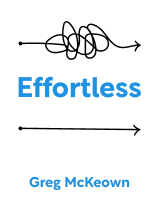

This article is an excerpt from the Shortform book guide to "Effortless" by Greg McKeown. Shortform has the world's best summaries and analyses of books you should be reading.
Like this article? Sign up for a free trial here.
Do you tend to put off important yet tedious work until the last minute? What are some ways you can make tedious tasks more bearable?
One of the main reasons we struggle to get tedious tasks done consistently is that we dread doing them and thus put them off for as long as possible. In his book Effortless, Greg McKeown suggests several ways we can make our most tedious activities more enjoyable or, at the very least, more tolerable.
Here’s how to turn tedium into fun.
Combine Work and Play
When we have fun, it doesn’t feel like we’re putting in much effort. Therefore, instead of learning to endure tedious work, McKeown recommends finding ways to enjoy it.
One way you can learn to enjoy a mandatory activity is to combine it with an activity you already enjoy. McKeown notes that some people try to self-motivate by rewarding themselves after they complete an activity, but he argues that’s less effective than combining the reward and essential activity. For example, enjoy your favorite snack while you file that dreaded business report, not after. This way, you look forward to the activity you once dreaded because it’s now associated with something you enjoy.
| Transforming Positive Experiences McKeown advocates combining work and play to increase productivity and happiness. In Minimalism, Joshua Fields Millburn and Ryan Nicodemus promote a similar tactic to “live a meaningful life.” Millburn and Nicodemus identify two types of positive experiences: ones you enjoy and ones that are good for you but that you dislike (like exercising, eating well, or taking on new challenges). To improve your life, find ways to turn positive experiences you dislike into ones you enjoy. As McKeown suggests, an easy way to do this is to add fun to the activities you don’t enjoy. For example, listen to music while you exercise, or dance while you clean. |
Add Meaning to Daily Activities
McKeown argues that infusing daily habits with meaning can also help make them more enjoyable. Imbuing an activity with meaning makes it feel more valuable, which can provide a new psychological benefit and make the activity feel more effortless. This simple change in attitude can turn a tedious chore into an activity that brings comfort or joy. For example, when making dinner, focus on the nourishment the food provides your mind and body. When viewed in this way, cooking a meal may become a more meaningful and enjoyable experience.
(Shortform note: In The Happiness Project, Gretchen Rubin also argues that adding purpose to activities can bring you comfort and joy, but she recommends a different approach. Instead of adding purpose to tedious chores, Rubin says you should add purpose to the activities you enjoy. This will add more value to the things you already enjoy and help you commit more time to things that are good for you. To that end, Rubin might recommend deciphering the lyrics of your favorite album or learning how to play a favorite song on an instrument. Now you’ve developed a new skill by adding purpose to a hobby.)

———End of Preview———
Like what you just read? Read the rest of the world's best book summary and analysis of Greg McKeown's "Effortless" at Shortform.
Here's what you'll find in our full Effortless summary:
- Why you don't need to hustle and burn out to achieve your goals
- Why the easiest path to success is the most viable
- Actionable advice for how to achieve effortless success in life






